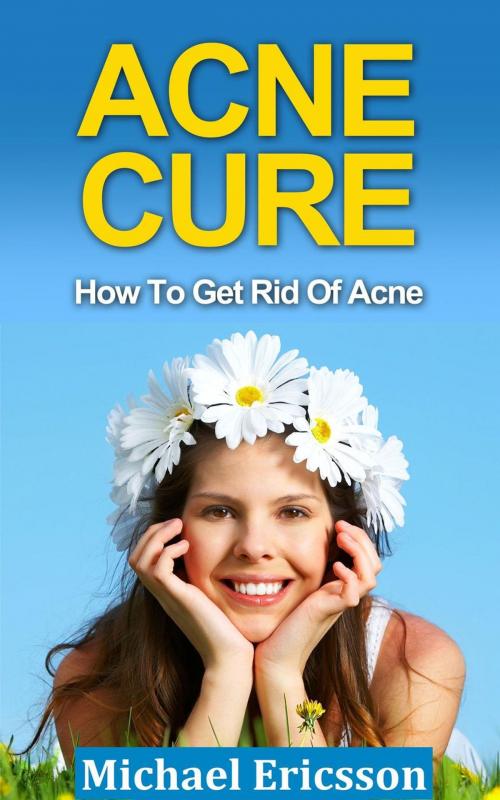Acne Cure: How To Get Rid Of Acne
Nonfiction, Health & Well Being, Health, Ailments & Diseases, Allergies, Beauty & Grooming| Author: | Dr. Michael Ericsson | ISBN: | 9781502246745 |
| Publisher: | Dr. Michael Ericsson | Publication: | December 27, 2014 |
| Imprint: | Language: | English |
| Author: | Dr. Michael Ericsson |
| ISBN: | 9781502246745 |
| Publisher: | Dr. Michael Ericsson |
| Publication: | December 27, 2014 |
| Imprint: | |
| Language: | English |
Acne Cure: How To Get Rid Of Acne: The Amazing Acne Treatment Secret Of Top Models And Celebrities! Read on your PC, Mac, smart phone, tablet
This book contains proven steps and strategies on how to manage your acne and the steps celebrities have taken to manage theirs. You must remember that it takes patience to take this path but your patience will pay off in the end. It may be a challenging journey but it will lead you to having clear skin.
Acne is a skin condition that is very common but if it is not managed well, it can lead to greater skin problems and self-esteem issues. Being able to look good is coveted by everyone and that is why having great skin is given high importance in our society. You may notice that there are thousands of skin care products being sold everywhere and those products promise to give you flawless skin in no time, but if all those products worked then no person in this world would be suffering from acne. Does that mean that none of these products work? No, it just means acne is not properly managed by using these products alone and there is no one solution to acne. In this book we share with you the secrets when it comes to managing your acne and the secrets that celebrities use to keep their acne at bay.
Here Is A Preview Of What You'll Learn...
What is Acne?
Causes of Acne
Acne Myths
Skincare Secrets of Celebrities
Time for the Dermatologist
A Lifestyle Change
Much, much more!
What is Acne?
Acne or acne vulgaris is a condition of the skin which occurs when the hair follicles become blocked with oil and dead skin cells. It is a very common human skin disease which is characterized by areas of scaly red skin, blackheads and whiteheads, pinheads, large papules, pimples and scarring. This condition can be very distressing and annoying. The lesions caused by acne can heal very slowly and when those have healed, other lesions crop up. The severity of acne can cause emotional problems such as the reduction of self-esteem, depression, and in extreme cases even suicide.
During the period of adolescence, this condition is usually triggered by an increase in androgens such as testosterone. It normally happens during this period of a person regardless of sex. An estimated 80 to 90 percent of teenagers have acne. For many people, acne goes away over time and tends to disappear by the age of 25 but there is no way for a person to determine how long it will take for the acne to disappear. There are people who still have acne in their 30s, even in their 40s and 50s. Acne usually affects the areas of the skin which have a greater number of oil glands like the face, the neck, the chest, the back and the shoulders.
Acne can come in inflammatory and non inflammatory types.
For acne with non-inflammatory lesions, it is characterized by comedones which are commonly referred to as whiteheads and blackheads. When the openings of the hair follicles have become clogged with oils, dead skin cells and bacteria, the comedones are formed. These comedones are blackheads when they are open at the surface of the skin which gives them a dark appearance.
Acne Cure: How To Get Rid Of Acne: The Amazing Acne Treatment Secret Of Top Models And Celebrities! Read on your PC, Mac, smart phone, tablet
This book contains proven steps and strategies on how to manage your acne and the steps celebrities have taken to manage theirs. You must remember that it takes patience to take this path but your patience will pay off in the end. It may be a challenging journey but it will lead you to having clear skin.
Acne is a skin condition that is very common but if it is not managed well, it can lead to greater skin problems and self-esteem issues. Being able to look good is coveted by everyone and that is why having great skin is given high importance in our society. You may notice that there are thousands of skin care products being sold everywhere and those products promise to give you flawless skin in no time, but if all those products worked then no person in this world would be suffering from acne. Does that mean that none of these products work? No, it just means acne is not properly managed by using these products alone and there is no one solution to acne. In this book we share with you the secrets when it comes to managing your acne and the secrets that celebrities use to keep their acne at bay.
Here Is A Preview Of What You'll Learn...
What is Acne?
Causes of Acne
Acne Myths
Skincare Secrets of Celebrities
Time for the Dermatologist
A Lifestyle Change
Much, much more!
What is Acne?
Acne or acne vulgaris is a condition of the skin which occurs when the hair follicles become blocked with oil and dead skin cells. It is a very common human skin disease which is characterized by areas of scaly red skin, blackheads and whiteheads, pinheads, large papules, pimples and scarring. This condition can be very distressing and annoying. The lesions caused by acne can heal very slowly and when those have healed, other lesions crop up. The severity of acne can cause emotional problems such as the reduction of self-esteem, depression, and in extreme cases even suicide.
During the period of adolescence, this condition is usually triggered by an increase in androgens such as testosterone. It normally happens during this period of a person regardless of sex. An estimated 80 to 90 percent of teenagers have acne. For many people, acne goes away over time and tends to disappear by the age of 25 but there is no way for a person to determine how long it will take for the acne to disappear. There are people who still have acne in their 30s, even in their 40s and 50s. Acne usually affects the areas of the skin which have a greater number of oil glands like the face, the neck, the chest, the back and the shoulders.
Acne can come in inflammatory and non inflammatory types.
For acne with non-inflammatory lesions, it is characterized by comedones which are commonly referred to as whiteheads and blackheads. When the openings of the hair follicles have become clogged with oils, dead skin cells and bacteria, the comedones are formed. These comedones are blackheads when they are open at the surface of the skin which gives them a dark appearance.















